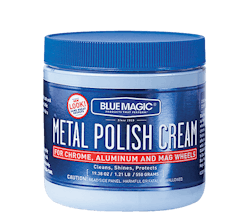Keeping your truck’s exterior looking good won’t improve fuel efficiency or uptime, but do not discount the intrinsic value. It’s undeniably good for branding and reputation, as a fleet’s trucks have the company name and logo plastered on the sides, making them essentially rolling billboards. A fresh wax job indicates pride in your equipment and dedication to small details, while a dirty, beat-up rig tells customers maintaining a professional appearance is low priority.
“Everyone going down the road notices clean trucks and trailers, and also dirty trucks and trailers,” said Michael Gray, assistant shop manager at K&J Trucking, a Best Fleets to Drive For winning fleet out of Sioux Falls, South Dakota.
Plus, a dirty or poorly maintained truck can signal to Commercial Vehicle Safety Alliance inspectors that a closer look might be warranted. Visual indicators of neglect raise red flags, and can make inspectors question what else you’ve missed.
And neglecting filth for too long can cause real damage. “If you let any type of particles, dirt, debris, pollen, or contamination sit on the vehicle for too long, the vehicle can actually be damaged beyond repair in terms of cleaning,” explained Zeb Alford, owner of Clean Z’s Mobile Detailing in Raleigh, North Carolina.
Wax on, dirt off
A clean, polished truck turns heads on the highway, and with the right techniques and wash intervals, it doesn’t need to be a big to do. Most agree that the best practice is to make sure vehicles are simply washed regularly. Good old soap and water will take off most dirt and grime, maintaining the wax coating for longer.
“I don’t think you need to have a wax and polish every time the truck is in, but the wash itself will keep everything clean and shiny without overdoing it,” Gray said. “Start with a good mix of soap and water to get the grime off.”
Jhonny Interian, detail shop manager at JLE Truckwash, agreed, recommending a wash no less than once per month for most of the year, and at least twice a month in the winter to combat corrosion from chemicals and salt on the roads.
Chris Foley, detail manager at Fyda Freightliner in Columbus, Ohio, advised a wash every 2 to 4 weeks, depending on usage and road conditions. “For fleet trucks, it’s often easier to stay on a more frequent schedule since many fleets have access to on-site wash facilities,” he explained. “However, for owner-operators, washing may happen less frequently due to limited access to facilities. In these cases, we recommend washing the truck every 4 to 6 weeks, or sooner if driving through harsh weather or dirty conditions.”
Hand washing is the preferred method of the detailing professionals who responded, as sometimes the tools can be detrimental.
“Brushes will leave swirl marks,” cautioned Vann Brown, founder and CEO of Brown Ox Ventures and inventor behind the BullSnot! cleaning product line, explaining that more often than not, they just push the dirt and grime back and forth over the paint. “You’ve got to be real careful with people using brushes, especially on black paint.”
“Hand washing is the preferred method for deep cleaning,” Interian concurred. “Handheld pressure washing wands with soft bristle brushes will get rid of the maximum amount of road grime that cannot always be removed by automated systems. Automated systems also cannot adequately wash the engine compartment to provide a good visual inspection.”
Another advantage of manual cleaning is the ability to adjust during the process based on the condition of the vehicle and what you notice as you’re washing.
“I feel as if hand washing is always better,” Gray said. “You get a better idea of what’s coming off the truck and can control the pressure of the water and brushes better than a machine.”
There is also the risk of missing spots when using automated washing tools, Brian Warner, owner of One Touch Detailing, pointed out, listing the inside of the rims, wheel wells, the grille, and emblems as places that are hard to reach without using your hands.
When it comes to power washing, be aware of the water pressure, as a high psi could result in the water damaging paint or stripping the clear coat.
According to Clean Z’s Alford, anything under 2,300 psi should be safe for most applications. He uses a 1,800 psi pressure washer to err on the side of caution.
Warner also highlighted the importance of using the correct spigot or nozzle on the washer, referring to attachments that can be used for more aggressive cleaning applications.
“If those things can damage concrete, imagine what it could do to paint,” he pointed out.
Another thing for fleets to keep in mind, especially when using new products, is to simply read the directions.
Brown mentioned having to correct users of his products when they spray and immediately wipe the product right off.
“If you do that, you’re not taking advantage of the technology in the can,” he said, recommending that customers leave it on 15 seconds to let the product do its work.
How to minimize scratches and chips
- Act fast: The longer that scratches or chips are exposed to the elements, the more likely they’ll lead to rust, oxidation, or peeling. Even small imperfections should be addressed quickly.
- Keep the area clean: Gently wash around the damaged spot to remove dirt or contaminants. Dirt can worsen scratches and trap moisture against exposed metal.
- Seal the damage temporarily: Use a quality touch-up paint or protective coatings to seal the area until it can be properly refinished. This will help keep the exposed metal from rusting or oxidizing.
- Avoid harsh chemicals or pressure washers: These can worsen peeling or lift clear coat around scratched areas. Stick with mild soap and hand-washing near the damage.
-Chris Foley, detail manager at Fyda Freightliner
Scratches can sometimes be handled with a good buffing compound and some elbow grease, but it depends on the severity of the blemish.
“There are many good products on the market that need to be used by commercial vendors with the correct power tools and buffing pads,” cautioned Interian.
Deeper issues with paint are another story, however, and usually need to be fixed professionally.
“For paint chips, you really need to just have that touched up and sealed properly so the paint doesn’t peel off,” warned Gray.
Interian agreed, noting that the best bet is to just take the vehicle to a body shop.
And don’t forget the finishing touches, the details that will make the truck pop and stand out to others on the road.
“On trucks, you’re always going to notice a shiny tailpipe or a door handle,” Alford added. “Make sure those are streak-free.”
K&J’s Gray recommends Blue Magic Metal Polish Cream, a non-abrasive solution that can be used on all metal to remove tarnish and oxidation. The cream can be used with buffers and polishers to create a lasting protective coating.
And while a clean exterior does not impact vehicle performance and uptime, under the hood is another story.
“Keeping salt and grime away from a truck’s important components will increase the lifespan of those parts,” Gray noted. “Minimizing corrosion is also very important where steel and aluminum meet.”
Interian agreed, adding that the time spent cleaning a vehicle can also reveal issues that require additional attention.
“Regular washing of the engine and compartment allows for easy visual inspection for leaks and other worn components,” he explained. “Engine bay washing should be done as a regular part of the detail services.”
Detailing by its very nature is not a value-add for your fleet, but keeping up appearances with routine cosmetic maintenance benefits every fleet, whether it’s a handful of HVAC vans or dozens of heavy-duty trucks. Because the inverse, ignoring unsightly scuff marks and bug guts on the exterior, or soiled seats and piles of fast-food bags on the inside, imply you cut corners and lack attention to detail.
About the Author

Lucas Roberto
Lucas Roberto is an Associate Editor for Fleet Maintenance magazine. He has written and produced multimedia content over the past few years and is a newcomer to the commercial vehicle industry. He holds a bachelor's in media production and a master's in communication from High Point University in North Carolina.



![Fyda Freightliner uses a mild wheel acid on the tanks, wheels, and frames to lift the oxidation off. According to detail manager Chris Foley, “the results are much quicker than just pressure washing alone, [but] you must be diligent in properly rinsing it off to get the desired results.” Fyda Freightliner uses a mild wheel acid on the tanks, wheels, and frames to lift the oxidation off. According to detail manager Chris Foley, “the results are much quicker than just pressure washing alone, [but] you must be diligent in properly rinsing it off to get the desired results.”](https://img.fleetmaintenance.com/files/base/ebm/fm/image/2025/06/68502fe624d929269b88fd5c-6830847404ce0c6793e1f486pressure_washing.png?auto=format,compress&fit=max&q=45?w=250&width=250)